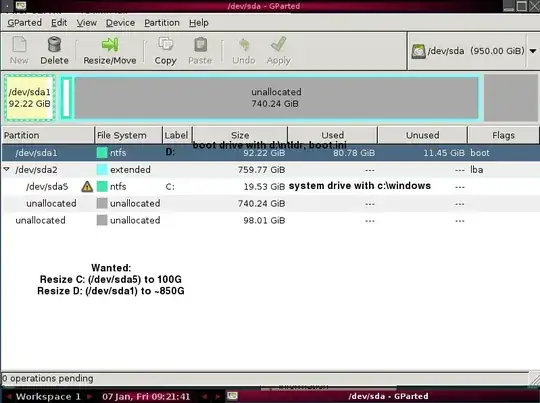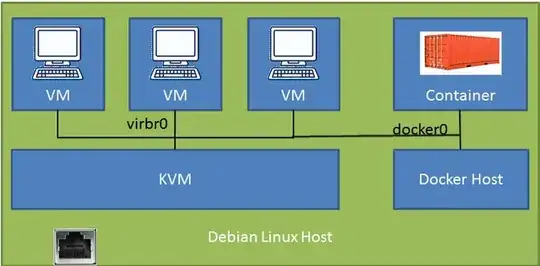I'm used to implement that using the following setup :
<interface type='bridge'>
<mac address='52:54:00:a9:28:0a'/>
<source bridge='br0'/>
<model type='virtio'/>
<address type='pci' domain='0x0000' bus='0x00' slot='0x03' function='0x0'/>
</interface>
opensvc service configuration
[DEFAULT]
docker_daemon_args = --log-opt max-size=1m --storage-driver=zfs --iptables=false
docker_data_dir = /{env.base_dir}/docker
env = PRD
nodes = srv1.acme.com srv2.acme.com
orchestrate = start
id = 4958b24d-4d0f-4c30-71d2-bb820e043a5d
[fs#1]
dev = {env.pool}/{namespace}-{svcname}
mnt = {env.base_dir}
mnt_opt = rw,xattr,acl
type = zfs
[fs#2]
dev = {env.pool}/{namespace}-{svcname}/docker
mnt = {env.base_dir}/docker
mnt_opt = rw,xattr,acl
type = zfs
[fs#3]
dev = {env.pool}/{namespace}-{svcname}/data
mnt = {env.base_dir}/data
mnt_opt = rw,xattr,acl
type = zfs
[ip#0]
netns = container#0
ipdev = br0
ipname = 1.2.3.4
netmask = 255.255.255.224
gateway = 1.2.3.1
type = netns
[container#0]
hostname = {svcname}
image = google/pause
rm = true
run_command = /bin/sh
type = docker
[container#mysvc]
image = mysvc/mysvc:4.1.3
netns = container#0
run_args = -v /etc/localtime:/etc/localtime:ro
-v {env.base_dir}/data/mysvc:/home/mysvc/server/data
type = docker
[env]
base_dir = /srv/{namespace}-{svcname}
pool = data
startup log
2019-01-04 11:27:14,617 - srv1.acme.com.appprd.mysvc.ip#0 - INFO - checking 1.2.3.4 availability
2019-01-04 11:27:18,565 - srv1.acme.com.appprd.mysvc.fs#1 - INFO - mount -t zfs -o rw,xattr,acl data/appprd-mysvc /srv/appprd-mysvc
2019-01-04 11:27:18,877 - srv1.acme.com.appprd.mysvc.fs#2 - INFO - mount -t zfs -o rw,xattr,acl data/appprd-mysvc/docker /srv/appprd-mysvc/docker
2019-01-04 11:27:19,106 - srv1.acme.com.appprd.mysvc.fs#3 - INFO - mount -t zfs -o rw,xattr,acl data/appprd-mysvc/data /srv/appprd-mysvc/data
2019-01-04 11:27:19,643 - srv1.acme.com.appprd.mysvc - INFO - starting docker daemon
2019-01-04 11:27:19,644 - srv1.acme.com.appprd.mysvc - INFO - dockerd -H unix:///var/lib/opensvc/namespaces/appprd/services/mysvc/docker.sock --data-root //srv/appprd-mysvc/docker -p /var/lib/opensvc/namespaces/appprd/services/mysvc/docker.pid --exec-root /var/lib/opensvc/namespaces/appprd/services/mysvc/docker_exec --log-opt max-size=1m --storage-driver=zfs --iptables=false --exec-opt native.cgroupdriver=cgroupfs
2019-01-04 11:27:24,669 - srv1.acme.com.appprd.mysvc.container#0 - INFO - docker -H unix:///var/lib/opensvc/namespaces/appprd/services/mysvc/docker.sock run --name=appprd..mysvc.container.0 --detach --hostname mysvc --net=none --cgroup-parent /opensvc.slice/appprd.slice/mysvc.slice/container.slice/container.0.slice google/pause /bin/sh
2019-01-04 11:27:30,965 - srv1.acme.com.appprd.mysvc.container#0 - INFO - output:
2019-01-04 11:27:30,965 - srv1.acme.com.appprd.mysvc.container#0 - INFO - f790e192b5313d7c3450cb257d075620f40c2bad3d69d52c8794eccfe954f250
2019-01-04 11:27:30,987 - srv1.acme.com.appprd.mysvc.container#0 - INFO - wait for up status
2019-01-04 11:27:31,031 - srv1.acme.com.appprd.mysvc.container#0 - INFO - wait for container operational
2019-01-04 11:27:31,186 - srv1.acme.com.appprd.mysvc.ip#0 - INFO - bridge mode
2019-01-04 11:27:31,268 - srv1.acme.com.appprd.mysvc.ip#0 - INFO - /sbin/ip link add name veth0pl20321 mtu 1500 type veth peer name veth0pg20321 mtu 1500
2019-01-04 11:27:31,273 - srv1.acme.com.appprd.mysvc.ip#0 - INFO - /sbin/ip link set veth0pl20321 master br0
2019-01-04 11:27:31,277 - srv1.acme.com.appprd.mysvc.ip#0 - INFO - /sbin/ip link set veth0pl20321 up
2019-01-04 11:27:31,281 - srv1.acme.com.appprd.mysvc.ip#0 - INFO - /sbin/ip link set veth0pg20321 netns 20321
2019-01-04 11:27:31,320 - srv1.acme.com.appprd.mysvc.ip#0 - INFO - /usr/bin/nsenter --net=/var/lib/opensvc/namespaces/appprd/services/mysvc/docker_exec/netns/fc2fa9b2eaa4 ip link set veth0pg20321 name eth0
2019-01-04 11:27:31,356 - srv1.acme.com.appprd.mysvc.ip#0 - INFO - /usr/bin/nsenter --net=/var/lib/opensvc/namespaces/appprd/services/mysvc/docker_exec/netns/fc2fa9b2eaa4 ip addr add 1.2.3.4/27 dev eth0
2019-01-04 11:27:31,362 - srv1.acme.com.appprd.mysvc.ip#0 - INFO - /usr/bin/nsenter --net=/var/lib/opensvc/namespaces/appprd/services/mysvc/docker_exec/netns/fc2fa9b2eaa4 ip link set eth0 up
2019-01-04 11:27:31,372 - srv1.acme.com.appprd.mysvc.ip#0 - INFO - /usr/bin/nsenter --net=/var/lib/opensvc/namespaces/appprd/services/mysvc/docker_exec/netns/fc2fa9b2eaa4 ip route replace default via 1.2.3.1
2019-01-04 11:27:31,375 - srv1.acme.com.appprd.mysvc.ip#0 - INFO - /usr/bin/nsenter --net=/var/lib/opensvc/namespaces/appprd/services/mysvc/docker_exec/netns/fc2fa9b2eaa4 /usr/bin/python3 /usr/share/opensvc/lib/arp.py eth0 1.2.3.4
2019-01-04 11:27:32,534 - srv1.acme.com.appprd.mysvc.container#mysvc - INFO - docker -H unix:///var/lib/opensvc/namespaces/appprd/services/mysvc/docker.sock run --name=appprd..mysvc.container.mysvc -v /etc/localtime:/etc/localtime:ro -v /srv/appprd-mysvc/data/mysvc:/home/mysvc/server/data --detach --net=container:appprd..mysvc.container.0 --cgroup-parent /opensvc.slice/appprd.slice/mysvc.slice/container.slice/container.mysvc.slice mysvc/mysvc:4.1.3
2019-01-04 11:27:37,776 - srv1.acme.com.appprd.mysvc.container#mysvc - INFO - output:
2019-01-04 11:27:37,777 - srv1.acme.com.appprd.mysvc.container#mysvc - INFO - 1616cade9257d0616346841c3e9f0d639a9306e1af6fd750fe70e17903a11011
2019-01-04 11:27:37,797 - srv1.acme.com.appprd.mysvc.container#mysvc - INFO - wait for up status
2019-01-04 11:27:37,833 - srv1.acme.com.appprd.mysvc.container#mysvc - INFO - wait for container operational

